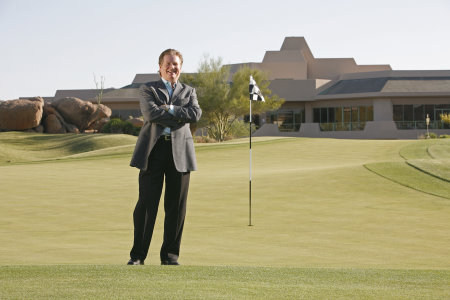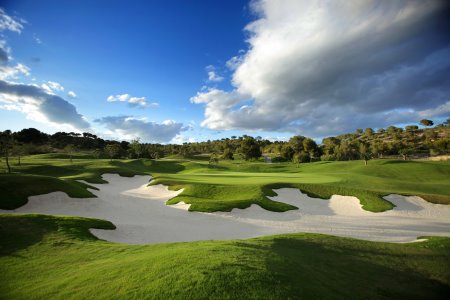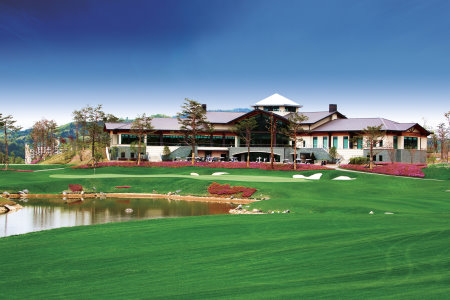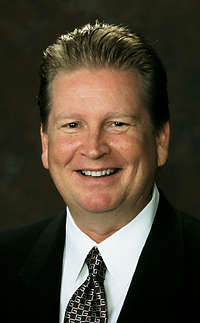
GBN talks exclusively to Dana Garmany, founder, CEO and Chairman of Troon Golf and Golf Inc.’s ‘Most Powerful Man in Golf Business’ for the last two years.
The heads of several US golf management companies appeared in the Golf Inc listing (although not as high as you and Troon, obviously) and I think that you said around 15% of US golf courses are run by such companies. How would you categorize these other companies? Do they operate in different market segments? Different Regions? Is there one that is a particular rival to Troon?
We certainly feel a shift has occurred in our industry where we have more competition for projects coming from other companies versus self-managed. For many years, by far and away we saw more decisions made “Troon or we do it ourselves,” and now we find in most cases banks, lenders, owners, boards, have figured out management companies generally do it better than an individual club or owner. Clearly we see some national companies who we compete with, and there are a couple of those, but we also compete with regional companies in certain parts of the world as well.
In past years, Clubcorp and American Golf have attempted to operate outside of the US but neither has had the success that Troon Golf has enjoyed in these markets. What have you done differently or better?
I certainly wouldn’t say our expansion outside the United States has been easy, and we have made plenty of mistakes, and lost money in several areas. But, we have tried to learn from each experience, and have always pushed towards our goal of being a global company. I think the only thing we probably did differently than our competitors was be more patient, and also trying our best to avoid having ex-patriots do the heavy lifting. We certainly try to minimize that and work with local labour and management.

What economies of scale and other benefits derive from being part of a management group rather than operating as a stand-alone facility?
Obviously, having more than 200 golf courses increases our buying power by centralizing services like accounting, human resources and IT for example. In some cases we have seen our insurance package savings alone pay for our entire annual management fee.
New Business
Where do you expect Troon’s future growth to come from? I guess that varies from country to country?
Our current centers of growth are private clubs in the USA, and further expansion into Europe, North Africa, the Middle East and Asia. Clearly Asia as a whole is a very interesting prospect. There are economies such as Korea and China that continue to buck the economic trends currently magnified in the West. Korea has a strong market for golf and high demand for top quality venues. We have been involved with some projects in Korea. Like the Chinese, Indian and South East Asian market, there are some cultural trends that we have to be aware of and spend time understanding. Whilst we can understand an owner’s objective at a business level, it is important we get a firm grasp of consumer behaviour in order to create a product people want. I see our business going from strength to strength in Korea, as what we are seeing is the appetite for quality and a necessity to differentiate. It is becoming a more

aggressive market place and we are tuned into some of the underlying issues that need to be managed in order to see golf reignite its growth in the region. As our services are being deployed in India, China, Malaysia, Korea more and more we are able to apply lessons learned from other regions from around the world to ensure that all aspects of the property are working in unison and in line with the product life cycle. Understanding the local dynamic has been the biggest hill for us to climb as the business has spread its wings. It has also been one of our biggest success stories.
What are your ambitions for the Company in the next few years?
We want to keep our heads down and do what we do best, manage and improve golf and club operations, and simply continue to grow the brand around the globe.It is our company ethos that makes the business cutting edge. We have a well-informed forward looking team of dedicated professionals that have made the hospitality and golf industry their career. We try to strike the balance to fuel ideas based on fact. Outside of the box thinking only works if it can be integrated. We share ideas between our teams and units, relate them back to past experiences and what structures need to exist to cope with new methods.

Have you identified any particular ‘hotspots’ where your resources will be concentrated?
Beyond the USA, I think Asia and the Middle East; in particular Korea, China, Abu Dhabi, Dubai, Bahrain and Qatar will get a lot of our attention in the coming years, along with parts of North Africa.
What methods will you be using to promote the Troon Golf brand?
The Troon brand stands for quality hospitality, whether in golf, clubs, or lodging, and we plan to expand the brand so it becomes more and more of a “lifestyle brand” to consumers.Our network, our people, communication and work philosophy has given Troon the impetus to succeed and for owners to sit up and take note. It is this experience that has built momentum enough for the ‘Golf’ to be dropped from our company name. Our areas of expertise are being applied into leisure and hospitality more regularly, developing F&B programs for first class restaurants and Beach Club management, which we have ambition to grow in line with our golf specific business.
Owners
Do you have a set of standard terms for your relationship with the owners? And a set length of contract with options to renew?
Every one of our contracts probably has some unique feature to it that sets it apart from others. But generally, we are looking for a long enough term to complete the task given, a base management fee, and then some sort of incentive, likely profitability on the public or resort side, and member satisfaction on the private side. Most contracts will have a renew option at the end.
Are your services available only as a total package or would you allow a client to cherry-pick, say, agronomy and golf operations only, keeping F&B and hospitality in-house?
Generally, we provide all services, but in some resort operations, the hotel operator might do the Food and Beverage operation if that is more efficient. Also, in very limited cases, we have done agronomy only services for clients.
Does Troon own any of the properties that it manages?
We have a few equity positions at properties, but very few compared to the manage-only side. Roughly 98% are management only.
Does Troon Golf see potential for original project development/management on its own behalf?
We have always had the capacity to build and develop from the ground up, and always keep the potential open that we might one day brand a facility with our name, or participate in the equity. Nothing as of now is in planning, and we don’t see that in the near future based upon the lack of development projects worldwide.
Third-party tee time sellers

Does Troon use the services of third-party tee time sellers? If not why not; if yes, what are the benefits and are there any risks in doing this?
We do business with third party tee time sellers, but we do it within our own framework of price controls. Certainly, allowing your inventory to be controlled by someone else is quite risky and can have a negative impact on profits if the operator is not careful in how the agreements are struck.
Revenue management etc
With all the management experience that Troon has behind it you must have developed your own techniques in this and in other areas too. When you make a pitch to a prospective client what are the main things that you say will accrue to the business if Troon Golf is hired?
In today’s world, we are generally pitching improved top line revenues through our sales and marketing initiatives, as most operators have already made most of the cuts that can be made. Of course, with our centralization and buying power, we can also reduce expenses somewhat, but we generally want to try and improve the top line.
Recruitment
In your interview with Don Riddell of CNN, you talked a lot about the importance of having the right staff. Could you expand on that topic for me? Can you characterize a successful potential candidate for a position with Troon Golf? What about the development and further training of your people once they have joined the team?
I have always felt each leader should hire a key staff around them they feel equal or superior to them in intellect, drive, financial skills, etc. If you do that, you also find yourself pushed to do better. This means that having great people on our teams, we also have expansion opportunities for them as they grow and improve as leaders. When we hire young men and women at our facilities, they are monitored and tutored to see each part of the operation and generally move around to see private, resort, and public operations so they understand how each works. We then try to find their “niche” and work with them to achieve their personal goals.
Slow Play
At the KPMG Golf Business Forum, we talked a lot about the problems caused by slow play and you mentioned the idea that you have on test whereby the early starters on each day know that they are expected to complete their rounds within a set time. Can you tell me about other ways in which Troon Golf manages the pace of play? I am thinking of things like intervals between start times, course set-up, course marshalls, signage etc.
We think pace of play is incredibly important right now for two reasons. First, the people who enjoy and play the game now are looking for ways to reduce their time exposure, and we want to assist with that. Second, and perhaps more importantly, we find a large group of people will not even try the game because we do not have a “one hour” game, or something they can do without a full or half day commitment. The game of Cricket is now attempting to try something new as well on the time element, and I think golf has to find various different “games” that can be done in an hour or 90 minutes that keep people in the sport.
Impact of Olympics
Troon Golf operates in many markets, some well-established, others in emerging golf nations. Have you observed evidence that the readmission of Golf as an Olympic sport is having an impact upon the growth of the game? Can you give some examples?
I think the Olympics are quite important for golf, particularly outside the USA. Being an Olympic sport adds credibility to the game, and encourages governments to add support to youth programs. We certainly hope that we can generate some more activity among youth in the next 4 years.
We have been reminded that in 2017 there will be a vote to decide if golf will remain in the Olympics and several people have expressed their concern that a standard 72 hole strokeplay format will not ‘cut it’ with the viewing public.
I tend to agree a 72 hole tournament, stroke play, is not the right way to go. Personally, I would like to see match play, with a similar qualification that soccer has to get to the Olympics or World Cup. Some of these matches leading up to the Olympics could even use some sort of “new” programming like playing less than 18 holes and other interesting variants. Then at the games themselves, the qualifiers revert to 18 hole match play without the thought of each country getting X number of participants…more of an “earn your way in,” but also using the prequalifying to highlight maybe something new in golf competition.
Do you have any thoughts about if and how Golf should be presented in a more ‘exciting’ way to appeal to the mass market? Suggestions have included a matchplay format, possibly preceded by a strokeplay qualifier; with pairs and mixed pairs as well as singles competitions. I think Jack Nicklaus II even suggested a ‘skills’ element of ‘longest drive’ and ‘nearest the pin’.
I love the idea of 9 short holes within a 9, love the idea of a larger hole, and love on parkland courses, 3, 6, and 12-hole loops. Obviously, not saying this for the core and serious golfer who wants the traditional experience, but I am saying we HAVE to think differently and realize the game is competing against all uses of time. I always use the example, two people can go to a tennis court and in 30 to 60 minutes, have a very good workout and some sort of game. We need something similar in golf.
Would you like to see more variety in the type of events sanctioned as part of the Tours? The LPGA seem to be willing to experiment with different formats and Giles Morgan, Head of HSBC sponsorship said that he could be receptive to the idea if it delivered a good experience for his clients.
I would love to see 9-hole matches on the tours and would love to see an equipment bifurcation where the old traditional golf courses can still be played without adding length and money spent to have them host an event. I’d also love to see golf become a sport where at The Open or The Masters for example, a consistent ball is used like in other sports that would be similar to the length of golf balls used in 1995. But, I want technology to help the average guy as well. Let’s remember that today’s golf ball really helps only clubhead speeds of something over 105 MPH. This means a 90 MPH clubhead speed guy gets little advantage anyway. We should make the game fun to watch again, not bomb and gouge, and be creative in having a variation of competitions.
Summing-up
We have had the ‘gold-rush’ years when even a badly-run golf business could just about survive. Now with supply exceeding demand, competition is fierce and times are tough. What’s key to the survival and future prosperity of individual golf businesses?
The key to survival is change, and for people to get their head out of the sand and realize just because something was done a certain way for 50 years, it does not mean it will be successful going forward. Young people do not think golf is cool, and do not think the rules make sense, do not think the dress codes make sense, and are not going to take 6 hours somewhere away from cell phones or text and email devices. We have to make the golf course a friendly place for people in all ways.
Dana Garmany, thank you for talking to GBN.com

